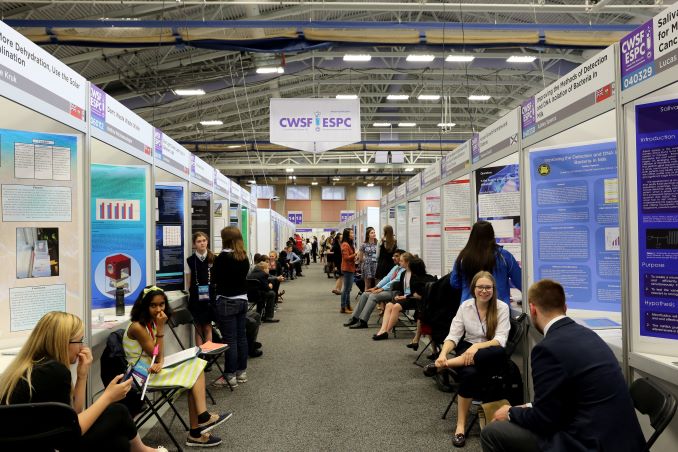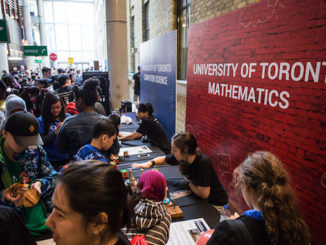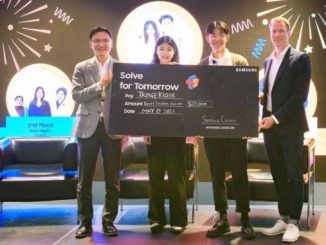As we age, we often lose our curiosity regarding science and asking questions. This week, we spoke to Reni Barlow, the executive director of Youth Science Canada (YSC) about how we can empower more youth to continue asking questions!

Describe your charity/non-profit in a few sentences.
Youth Science Canada (YSC) fuels the curiosity of Canadian youth through science, technology, engineering and mathematics (STEM) projects. We challenge students (primarily in grades 7-12) to investigate scientific questions and develop innovative solutions related to current and future challenges including agriculture, fisheries & food; digital technology; disease & illness; energy; environment & climate change; health & wellness; and natural resources. The results are astounding.
Roughly 500,000 K-12 students in Canada do STEM projects every year. YSC’s network of community-based members hosts 25,000 at over 100 science fairs in every province and territory, where STEM professionals meet the young scientists and review their projects. They select the top 500 for the national finals—the Canada-Wide Science Fair (CWSF).
YSC also selects youth and projects to represent the country at international youth STEM competitions and events and offers resources and workshops to help K-12 teachers integrate inquiry-based STEM activities and projects into their classroom.
What problem does it aim to solve?
We’re all born curious, but by middle and high school our kids are more focused on giving answers than asking questions. We want to change that.
When did you start/join it?
Youth Science Canada started in 1962 – 2021 is our 60th anniversary year. I attended my first Canada-Wide Science Fair in 1990 as an adult supervisor for the Toronto finalists. Over the next ten years, quite a few of my students were selected as CWSF finalists and I became more involved as a volunteer at the local, provincial and national levels. In 2002, the YSC Board of Directors asked me to consider leaving my role as a school principal in Toronto to become the organization’s executive director.
What made you want to get involved?
As a grade 7/8 teacher, I found that scientific inquiry activities and projects were powerful strategies for engaging students, developing their STEM skills and connecting their learning to what they cared about – a question or problem, helping people or making the world a better place. Ultimately, I wanted to make those experiences available to every student in Canada.
What was the situation like when you started?
When I started with Youth Science Canada in 2002, inquiry and project-based activities were falling out of favour in education, with the emphasis shifting to “the basics,” prescribed content, and testing. Science projects and fairs were viewed as outdated, which made it challenging for teachers and students to incorporate them into their teaching and learning.
How has it changed since?
The past decade has seen renewed recognition of the value and importance of STEM and the development of inquiry and problem-solving skills – in education and for the country. Unfortunately, many teachers struggle to offer engaging, authentic STEM experiences that connect with student interests. As a result, many kids still see STEM as difficult and unrelated to what they care about.
What more needs to be done?
We tend to underestimate the capability of kids, their ideas, and their passion. We need to encourage kids to pursue interesting questions and challenging problems that matter to them – especially if we think it’s beyond them. Today’s students have access to more information than ever. We need to ensure that they have the skills, opportunities, and encouragement to tackle any question or problem they choose.
How can our readers help?
Parents can encourage their kids – and especially teens – to stay curious, pursue questions and develop solutions to problems that interest them. Answers and solutions generate new questions and ideas; once the fire of curiosity is ignited, it’s difficult to extinguish. Teachers can learn more about how inquiry and project-based approaches support curriculum expectations and STEM skills development through YSC’s Smarter Science professional development resources and workshops.
Do you have any events/announcements coming up?
The 2020 Youth Science Canada Online STEM Fair welcomed over 630 projects by grade 7-12 students from across Canada after the 2020 Canada-Wide Science Fair was cancelled. Readers can view all the projects and register to receive the student and teacher guides here.
Most of YSC’s 104 regional science fairs, including the Toronto Science & Technology Fair, will be held virtually in March or April. Click here to find your nearest regional fair.
We recently launched a new podcast – Why to How: Adventures in STEM – available on numerous podcasting platforms and YSC’s social media channels. The first episode features Canadian inventor Ann Makosinski who started by doing simple projects at home and then gained international recognition for her hollow flashlight and e-drink inventions.
Where can we follow you?
More information is available on our website. You can follow us on Facebook, Twitter and Instagram.
PAY IT FORWARD: What is an awesome local charity/nonprofit that you love?
For kids interested in robotics, check out FIRST Robotics Canada!


